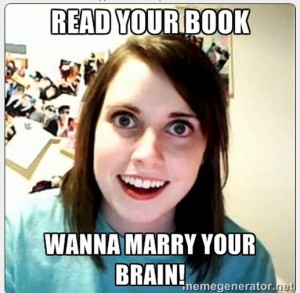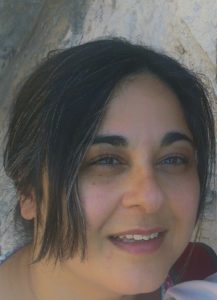As the Lethe Press website says, Heiresses of Russ reprints the prior year’s best lesbian-themed short works of the fantastical, the otherworldly, the strange and wondrous under one cover. With that in mind, I’ve asked author Claire Humphrey to come share some thoughts on the anthology and her story, “Eldritch Brown Houses,” which originally appeared in Daughters of Frankenstein: Lesbian Mad Scientists!
What do you think a phrase like lesbian-themed or lesbian story means in 2017? Do you think that has changed? How do you think it might change in the future?
When I think about the first lesbian-themed writing I remember reading, it was pretty focused on contemporary relationships and identity, on being lesbian in a heteronormative world. I think recently I’ve read a lot more that is broader in setting, like lesbians in space or lesbians in imaginary worlds, or broader in theme, where characters who are lesbians engage in a story that is mostly about economics or war. Only, every story is always partly about relationships and identity, no matter who the characters are and what the setting is, right? And have the stories changed, or is it just that I’m reading more widely than I did at first?
I think that maybe lesbian stories are reaching a wider audience than they used to, as the publishing industry becomes more diverse and readers eagerly respond. And I think it’s always important to represent diverse identities in stories, but especially in a time where parts of the world seem to be turning back toward bigotry.
What do you think we achieve by categorizing stories, tagging them with qualities that highlight sexuality (or gender, ability, and race) ? Is it a desired end point? A necessary stage on some collective journey humanity is taking?
I think it’s most necessary for the people who are feeling under siege, alone, without a community. When you see your identity represented, you feel less alone. And for a reader who doesn’t share that identity, that reader gets the opportunity to learn and become more empathetic. Tagging stories allows readers to head for what they want most.
Do I think it’s a desired end point? I don’t know—in a perfect world would we all feel sufficiently well represented that we wouldn’t ever need to seek out our own voices for comfort? Or would that tagging become part of a less-fraught but still lively set of messages that would help us choose and maintain both personal support and diversity in what we consume? I think we’re so far from that perfect world that right now we need to keep doing whatever we can to represent ourselves and each other kindly and fully.
Would you say your story in the collection is typical or emblematic of your work, or an outlier?
It’s typical of me in that it’s LGBT+, character-driven, and touching on dysfunctional families. It’s an outlier in that it is the first and only time I’ve written anything that riffs on Lovecraft. In the SF/F community there’s a lot of adoration and discussion of Lovecraft and I usually don’t participate because I’m bored by his work as well as offended by his attitudes. I challenged myself to find a way to write about him while still writing the kind of story that I usually write. This was the result.
If you were to pick stories for a historical overview–Best Heiresses of Russ of the Previous Century, that sort of thing–what would be the first story you’d seek out?
“The Clover Still Grows Wild in Wawanosh” by Kelly Rose Pflug-Back, published by Strange Horizons in 2013. (Podcast version here.) I love this story so much—it’s subtle, harsh, moving. It’s about identities in a post-apocalyptic world.
One of my previous interview series, The Heroine Question, generated some interesting discussion of the gendered term Heroine. What do you think of Heiresses of Russ as a title for this project? Should it be Inheritors or Heirs?
Frankly, I think it’s academic-sounding and uncommercial, which is something that often happens around idealistic, worthwhile projects: the people who get its meaning are an enthusiastic but really small group. Best Lesbian Fiction would get the job done just fine. This is me wearing my bookseller hat, obviously!
What are you working on now?
I have a whole bunch of new stories coming up soon, none of which have been publicly announced, but it’s been a nice couple of months for acceptances around here. I’m also working on two different options for my next book, which may or may not be a followup to Spells of Blood and Kin .
.


Claire Humphrey is the author of Spells of Blood and Kin (St Martin’s Press, 2016). Her short fiction has appeared in Strange Horizons, Beneath Ceaseless Skies, Apex, Crossed Genres, Fantasy Magazine, and Podcastle. Her short story ”Bleaker Collegiate Presents an All-Female Production of Waiting for Godot” appeared in the Lambda Award-nominated collection Beyond Binary, and her short story “The Witch Of Tarup” was published in the critically acclaimed anthology Long Hidden. Find her online at her website, on Facebook, or on Twitter:
About this interview: 2016 marked my debut as an editor, with the Lethe Press anthology Heiresses of Russ. I co-edited with the capable and lovely Steve Berman; our Table of Contents announcement is here. At that time I asked some of my contributors if they’d be interested in talking a little about the ideas behind their stories, about the idea of lesbian-themed genre fiction, or anything else that seemed interesting and relevant. These are their replies.
 In 2016 I read approximately 120 stories and/or partial novels from students, pieces ranging in length from 1,000 words to 25,000, and wrote a critique for each and every one. I also read over fifty stories, novelettes and novellas for the Heiresses of Russ 2016
In 2016 I read approximately 120 stories and/or partial novels from students, pieces ranging in length from 1,000 words to 25,000, and wrote a critique for each and every one. I also read over fifty stories, novelettes and novellas for the Heiresses of Russ 2016 anthology, which I co-edited with Steve Berman. Most of those, naturally, I read twice.
, by Kate Summerscale
, by Elizabeth Wein
by David Hughes
, by Dr. Vincent DiMaio
, by Kim Vicente
and Faithful Place
were among them, as was Minette Walters’ The Shape of Snakes
.









